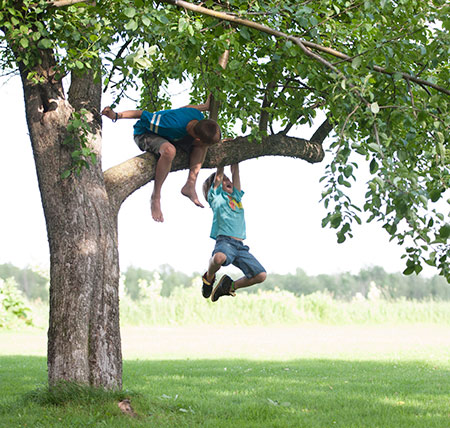 When kids play hard, they fall hard, too.
When kids play hard, they fall hard, too.
Sometimes those tumbles from the jungle gym and skateboard mishaps mean broken bones.
Unless the bone pokes through your child’s skin or the injured area looks deformed, it’s hard to tell if it’s broken and whether your child needs to see a doctor.
“It’s difficult to know when to take a child in for joint aches and pains after a fall,” said Dr. Jacob Lonsdale, a non-operative pediatric orthopedist at Marshfield Clinic.
Watch your child’s reaction to injury
A child’s reaction to a fall is a good early indicator of how serious the injury is.
If he gets up and keeps playing, parents probably don’t need to worry, Lonsdale said.
Refusing to use or put weight on the injured area often is a sign of a broken bone that needs medical attention.
Signs of a broken bone
After your child is calm, do a simple check for these signs of a broken bone:
- Point tenderness. If a certain spot over a bone is tender, the child likely has a broken bone. General pain over a larger area signals a bruise or sprain.
- Immediate and excessive swelling usually means a bone is broken.
- Numbness or cold to the touch. These symptoms could mean your child has nerve damage or that blood flow has been interrupted.
- Refusal to use or put weight on an injured area.
What to do if you suspect a broken bone
Seek immediate medical help if your child has any of these symptoms:
- Deformity in the injured area.
- The injured area is numb or cold to the touch.
- The child can’t move his fingers or toes.
Take your child to urgent care or make a same-day appointment with a pediatrician or a pediatric orthopedist if there are no concerning symptoms (mentioned above) but you think your child may have a broken bone.
Ice and ibuprofen will help ease pain and swelling until your child sees a doctor.
“Waiting a day or two to come in for mild injuries should not put the child at risk for long-term growth problems or arthritis,” Lonsdale said. “Waiting doesn’t mean you’re a bad mom or dad.”
Bruises and sprains may be treated at home, but parents shouldn’t hesitate to make an appointment if they’re concerned or have questions, he said.
Related Shine365 stories
Can broken bones affect children’s growth?
Kids’ exercise: The key to building better bones
Bearing the pain: Scaphoid bone fracture (wrist fracture)

